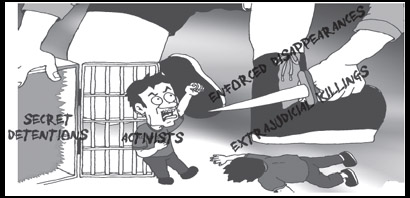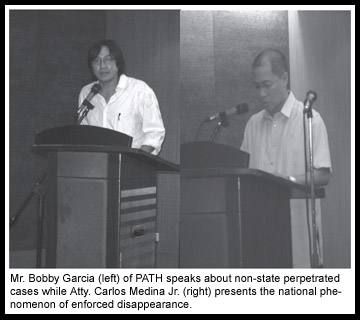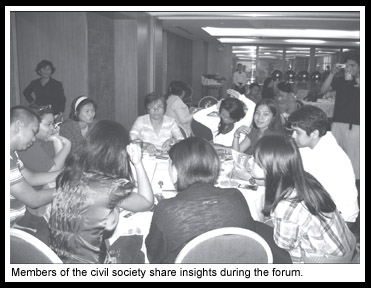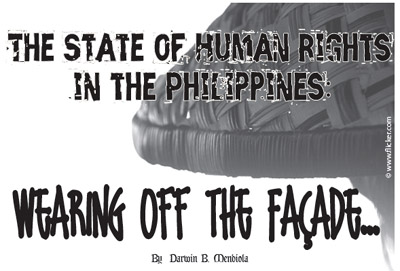The Philippine government repeatedly declares its
commitment to the protection and promotion of human rights and to take
serious and concrete actions to address human rights issues as its
obligation under the 1987 Constitution and several international treaties.
But its false pretenses are fast wearing off with its dismal human rights
record since 2001, not to mention the unresolved cases prior to 2001. The
country has become a haven of torturers, murderers and abductors who are
comfortably enjoying impunity that breeds non-accountability.
Life for those who stand against the large-scale
corruption, unfair socio-economic policies and self- erving political
agenda of the powers-that-be is rocked by fear of arbitrary arrests,
enforced disappearances and extrajudicial executions. The link between the
military and this specter of political violence has been undoubtedly
established by national and international institutions. But the Philippine
government, particularly its executive branch, has done nothing more than
sheer denial. In most cases, it stubbornly discredited any reports of
human rights violations without acting on these with due diligence. This
continues despite the sincere activism on the part of the judiciary in
coming up with legal remedies and mechanisms to purportedly address and
put an end to political violence.
However, after the Philippines underwent scrutiny on
its human rights performance under the Universal Periodic Review of the
United Nations Human Rights Council (HRC), it suddenly showed concern and
made itself open to dialogues with other stakeholders at various levels.
The Presidential Human Rights Committee (PHRC), an
inter-agency executive body organized to serve as the primary advisor to
the President in ensuring its compliance to the international human rights
obligations, is tasked to establish and forge a link and cooperation with
civil society in order to help the government draft a National Human
Rights Action Plan (NHRAP), a policy framework for institutional actions
on human rights and to put in place concrete and double measures. Its
efforts to finally work with non-government organizations by conducting
interactive dialogues and constructive discourses on human rights were
seen as a welcome development, though it should have been done long
before. It was eventually made possible on 17 March 2009 when the PHRC
together with the United Against Torture Coalition (UATC) and the Asian
Federation Against Involuntary Disappearance (AFAD) organized the first of
a series of public fora which intended to determine the advantages and
disadvantages of Philippine government’s plan to defer the implementation
of the Optional Protocol to the Convention Against Torture’s (OPCAT).

The Philippine Government acceded to the Convention
Against Torture (CAT) and Other Cruel, Inhuman or DegradingTreatment and
Punishment on 18 June 1986. On 23 August 2007, President Gloria
Macapagal Arroyo signed the OPCAT’s instrument of ratification. This
instrument was subsequently transmitted to the Senate for concurrence. But
before the Philippine Senate concurs to the OPCAT, Malacanang has already
expressed its intention to defer the implementation of the OPCAT through
the announcement made by Executive Secretary Eduardo Ermita on 23
September 2008 during a multi-stakeholders’ workshop tackling the
establishment of the National Preventive Mechanism of the OPCAT at the
Traders Hotel in Pasay City. He indicated two reasons for considering to
opt out, to wit: to make necessary improvements of conditions in places of
detention and to harmonize the domestic laws for their full
implementation.
 While
opting out is a prerogative of the state party provided under the Treaty’s
Article 24, this option however, elicited an adverse reaction from the
civil society particularly the members of the United Against Torture
Coalition (UATC), Philippines, a broad-based coalition of organizations
and individuals that has been working for years against torture in the
country. The UATC believes that this declaration is not only premature but
also it defeats no less than the very purpose of the OPCAT.
While
opting out is a prerogative of the state party provided under the Treaty’s
Article 24, this option however, elicited an adverse reaction from the
civil society particularly the members of the United Against Torture
Coalition (UATC), Philippines, a broad-based coalition of organizations
and individuals that has been working for years against torture in the
country. The UATC believes that this declaration is not only premature but
also it defeats no less than the very purpose of the OPCAT.
During the public forum, the members of the civil
society disproved the reasons of the government’s plan to defer. They
spelled out that OPCAT is designed as a practical tool to assist states in
its compliance with their existing obligations under the CAT. Its primary
purpose is to establish a system of regular and unannounced visits to
places of detention in order to prevent the commission of torture and
other forms of ill-treatment of persons deprived of their liberty and
conditions within detention facilities. They also brandished the
ambiguities of the government’s declaration of deferment that although the
OPCAT provides a state two options to defer, it can only choose one which
is either the establishment of the National Preventive Mechanism (NPM) or
the opening of its doors to the visits of the Subcommittee and not to
both. They noted the government’s excuses that improving first the jail
conditions is not a prerequisite to the implementation of the OPCAT.
Moreover, harmonization of laws and policy adjustments to domestically
establish and implement it can be done within a year if the task is taken
seriously. They even assure the government that OPCAT works on the
principle of confidentiality, mutual trust and cooperation and does not
intend to berate or condemn the state. This opinion was also shared by no
less than Atty. Leila de Lima, Chairperson of the Commission on Human
Rights (CHR) who expressed the CHR’s strong support for the immediate
ratification and implementation of the OPCAT. She also mentioned the CHR’s
intention to play a preeminent role in the establishment and the working
of the NPM. According to her, the CHR under the present institutional
set-up, is acting as the national preventive mechanism and can work well
if their mandates are properly, effectively and aggressively utilized.
 In
spite of CHR’s affirmation on the necessities and advantages of the OPCAT,
the representatives of the Philippine government who might have received
strict instructions from their bosses, were completely unmoved and did not
give any hint of rethinking their position. They offered a fool’s
consolation, though, by acceding to the suggestion that was put forward by
the civil society to form the Philippine OPCAT Working Group (POWG) whose
task is to formulate appropriate plans of action for the establishment of
the NPM through transparent, participative and consultative means. But how
POWG is placed in the government’s priority list, one can only surmise
because even before the body was instituted to do its work, the Philippine
government was already too eager to gloat itself in its second periodic
report as one of its major achievements at the CAT 42nd session from 27
April to 15 May 2009.
In
spite of CHR’s affirmation on the necessities and advantages of the OPCAT,
the representatives of the Philippine government who might have received
strict instructions from their bosses, were completely unmoved and did not
give any hint of rethinking their position. They offered a fool’s
consolation, though, by acceding to the suggestion that was put forward by
the civil society to form the Philippine OPCAT Working Group (POWG) whose
task is to formulate appropriate plans of action for the establishment of
the NPM through transparent, participative and consultative means. But how
POWG is placed in the government’s priority list, one can only surmise
because even before the body was instituted to do its work, the Philippine
government was already too eager to gloat itself in its second periodic
report as one of its major achievements at the CAT 42nd session from 27
April to 15 May 2009.
As the government savored this prized achievement, the
PHRC, which was overwhelmed with the “partnership” with civil society,
conducted a second forum on 22 May 2009 in the cooperation with the
Coalition Against Involuntary Disappearance (CAID) which enjoined all
stakeholders in a discussion about the on-going efforts of the Philippine
government to address the issue of enforced disappearances in the country.
However, the civil society looked at it as an opportunity to induce the
government into signing and ratifying the International Convention for the
Protection of All Persons from Enforced Disappearance and to once and for
all, immediately enact the long awaited draft bill criminalizing enforced
or involuntary disappearances into a national legislation.
Apparently, the government was more convinced to take
the advice of the Department of National Defense that it cannot sign and
ratify the UN Convention for the Protection of All Persons from Enforced
Disappearance as it may preempt its anti-insurgency campaign. It claimed
that even if the government is not a party to the treaty, it had already
taken a considerable number of specific measures to address this human
rights issues such as the creation of Task Force Usig and the Melo
Commission, and the institution of a better coordination between the
police and other agencies, strengthening of awareness of human rights
standards in different government line agencies and the establishment of
new human rights offices within the armed forces and the national police.
 But
the civil society argued that these efforts were not enough as human
rights violations continue unabated. They attributed the difficult
prosecution of perpetrators to the absence of a standard definition that
not only confuses the public but also complicates the approaches and
interventions to be employed by different stakeholders to address the
issue. If only the government has done its homework, it would have found
this legal framework in the said UN treaty and the House Bill 5886, or the
consolidated disappearance bill authored by various lawmakers in the House
of Representatives which it finally approved on 5 March 2009 and
transmitted to the Senate. It is however unlikely that this piece of
legislation will be acted upon by the Upper House before the end of 14th
Philippine Congress as the 2010 elections are now fast approaching,
driving politicians frantic in assuring themselves of political survival.
But
the civil society argued that these efforts were not enough as human
rights violations continue unabated. They attributed the difficult
prosecution of perpetrators to the absence of a standard definition that
not only confuses the public but also complicates the approaches and
interventions to be employed by different stakeholders to address the
issue. If only the government has done its homework, it would have found
this legal framework in the said UN treaty and the House Bill 5886, or the
consolidated disappearance bill authored by various lawmakers in the House
of Representatives which it finally approved on 5 March 2009 and
transmitted to the Senate. It is however unlikely that this piece of
legislation will be acted upon by the Upper House before the end of 14th
Philippine Congress as the 2010 elections are now fast approaching,
driving politicians frantic in assuring themselves of political survival.
In a desperate bid to make up for its inaction, the
PHRC drew the first straw in suggesting that it planned to replicate the
creation of a Working Group on enforced disappearance patterned to that of
the Philippine OPCAT Working Group (POWG). But before this body could be
created, the PHRC made a major blunder of issuing a malicious and
erroneous statement released and circulated by the Philippine Embassy in
Washington DC utterly discrediting the report of Karapatan on the
alleged disappearance of a Fil-Am activist, Melissa Roxas et al and
erroneously quoting the Asian Federation Against Involuntary
Disappearances (AFAD) and the Families of Victims of Involuntary
Disappearance (FIND) which, accordingly, made an initial investigation
discrediting the case.
By dragging the name of the CAID, FIND and the AFAD and
illustrating them as “more credible” groups to deal with, the PHRC has,
early enough, exposed its ill-intent of not only denying cases of human
rights violations but also of sowing divisions among civil society
organizations and pitting them against each other just to cover-up its
ineptness in solving these. The government gains nothing from this obvious
political vilification except to earn the contempt of the civil society in
the face of incontrovertible facts pointing to its lip-service approach in
addressing the problem. A virulent statement such as this especially
coming from the human rights office of the President manifests a wishful
thinking of a possible qualitative and quantitative improvement in the
human rights situation in the country during the remaining year of the
Arroyo administration in the absence of the latter’s sincerity and
political will to do so.
Dim, indeed, is the future of human rights in this
country.


 While
opting out is a prerogative of the state party provided under the Treaty’s
Article 24, this option however, elicited an adverse reaction from the
civil society particularly the members of the United Against Torture
Coalition (UATC), Philippines, a broad-based coalition of organizations
and individuals that has been working for years against torture in the
country. The UATC believes that this declaration is not only premature but
also it defeats no less than the very purpose of the OPCAT.
While
opting out is a prerogative of the state party provided under the Treaty’s
Article 24, this option however, elicited an adverse reaction from the
civil society particularly the members of the United Against Torture
Coalition (UATC), Philippines, a broad-based coalition of organizations
and individuals that has been working for years against torture in the
country. The UATC believes that this declaration is not only premature but
also it defeats no less than the very purpose of the OPCAT. In
spite of CHR’s affirmation on the necessities and advantages of the OPCAT,
the representatives of the Philippine government who might have received
strict instructions from their bosses, were completely unmoved and did not
give any hint of rethinking their position. They offered a fool’s
consolation, though, by acceding to the suggestion that was put forward by
the civil society to form the Philippine OPCAT Working Group (POWG) whose
task is to formulate appropriate plans of action for the establishment of
the NPM through transparent, participative and consultative means. But how
POWG is placed in the government’s priority list, one can only surmise
because even before the body was instituted to do its work, the Philippine
government was already too eager to gloat itself in its second periodic
report as one of its major achievements at the CAT 42nd session from 27
April to 15 May 2009.
In
spite of CHR’s affirmation on the necessities and advantages of the OPCAT,
the representatives of the Philippine government who might have received
strict instructions from their bosses, were completely unmoved and did not
give any hint of rethinking their position. They offered a fool’s
consolation, though, by acceding to the suggestion that was put forward by
the civil society to form the Philippine OPCAT Working Group (POWG) whose
task is to formulate appropriate plans of action for the establishment of
the NPM through transparent, participative and consultative means. But how
POWG is placed in the government’s priority list, one can only surmise
because even before the body was instituted to do its work, the Philippine
government was already too eager to gloat itself in its second periodic
report as one of its major achievements at the CAT 42nd session from 27
April to 15 May 2009. But
the civil society argued that these efforts were not enough as human
rights violations continue unabated. They attributed the difficult
prosecution of perpetrators to the absence of a standard definition that
not only confuses the public but also complicates the approaches and
interventions to be employed by different stakeholders to address the
issue. If only the government has done its homework, it would have found
this legal framework in the said UN treaty and the House Bill 5886, or the
consolidated disappearance bill authored by various lawmakers in the House
of Representatives which it finally approved on 5 March 2009 and
transmitted to the Senate. It is however unlikely that this piece of
legislation will be acted upon by the Upper House before the end of 14th
Philippine Congress as the 2010 elections are now fast approaching,
driving politicians frantic in assuring themselves of political survival.
But
the civil society argued that these efforts were not enough as human
rights violations continue unabated. They attributed the difficult
prosecution of perpetrators to the absence of a standard definition that
not only confuses the public but also complicates the approaches and
interventions to be employed by different stakeholders to address the
issue. If only the government has done its homework, it would have found
this legal framework in the said UN treaty and the House Bill 5886, or the
consolidated disappearance bill authored by various lawmakers in the House
of Representatives which it finally approved on 5 March 2009 and
transmitted to the Senate. It is however unlikely that this piece of
legislation will be acted upon by the Upper House before the end of 14th
Philippine Congress as the 2010 elections are now fast approaching,
driving politicians frantic in assuring themselves of political survival.